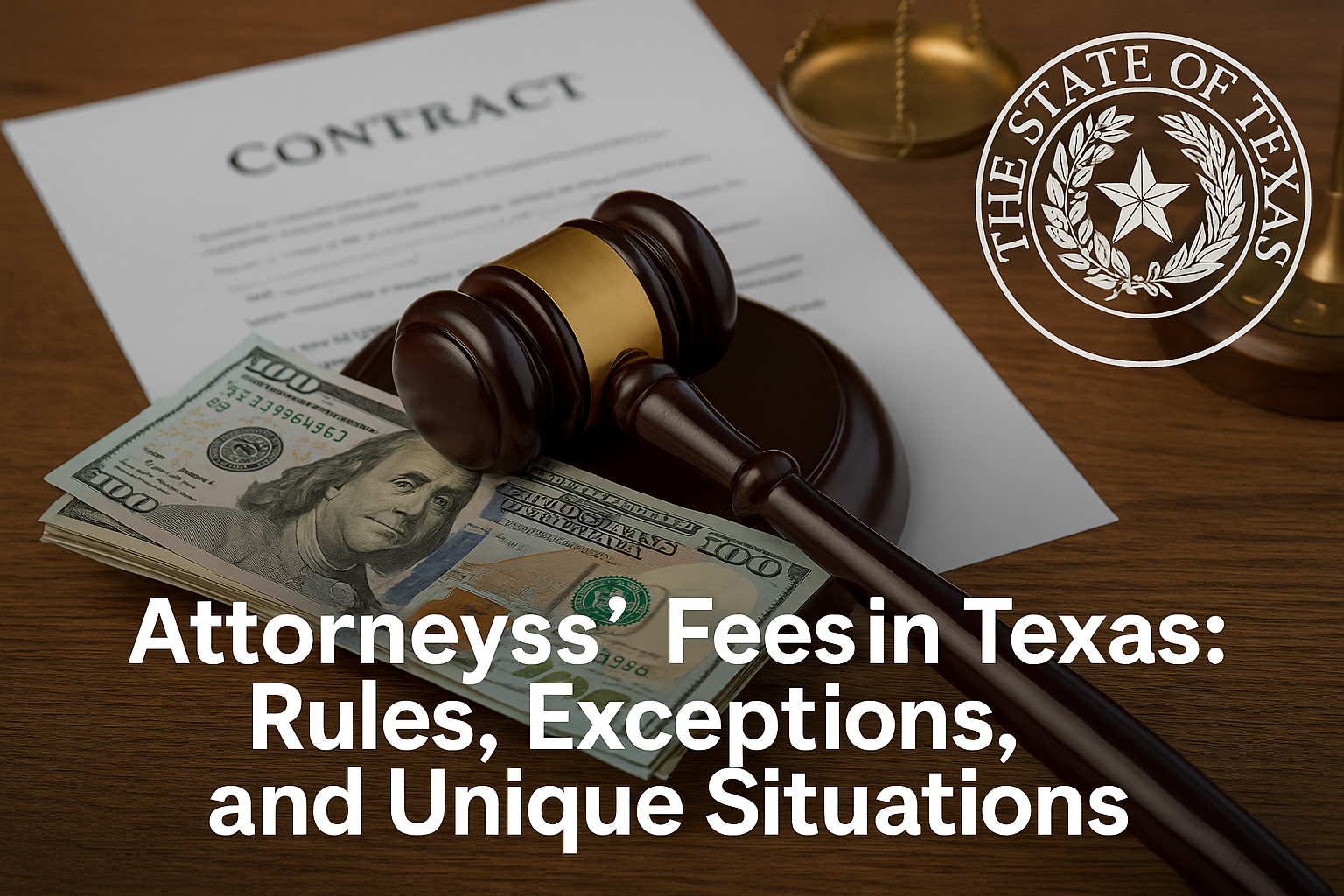
When disputes turn into lawsuits, one of the most common questions clients ask is: “If I win, will the other side have to pay my attorney’s fees?” In Texas, the answer depends on the type of case and the specific statutes or contracts at play. Unlike court costs, which are more routinely shifted to the losing party, attorneys’ fees are only recoverable in certain situations.
The General Rule in Texas
Under the “American Rule,” which Texas follows, each party is responsible for paying their own attorneys’ fees unless a statute or contract provides otherwise. This means that winning your case does not automatically entitle you to recover the cost of your legal representation from the other side.
Statutory Bases for Recovery
Texas law does provide specific statutory avenues for recovering attorneys’ fees. Some of the most common include:
● Breach of Contract: Section 38.001 of the Texas Civil Practice and Remedies Code allows the recovery of reasonable attorneys’ fees in successful breach of contract actions.
● Deceptive Trade Practices Act (DTPA): A prevailing consumer may recover attorneys’ fees, and in some cases, defendants may recover fees if the claim was groundless or brought in bad faith.
● Declaratory Judgments: The Uniform Declaratory Judgments Act gives courts discretion to award attorneys’ fees as “equitable and just.”
● Family Law Matters: In divorce and custody proceedings, Texas courts often award attorneys’ fees to ensure fairness, though such awards are discretionary.
Many other statutes—ranging from landlord-tenant law to property code provisions—also contain fee-shifting language.
Contractual Attorneys’ Fees
Parties to a contract may also agree in advance that, in the event of a dispute, the prevailing party will be entitled to attorneys’ fees. Courts generally enforce these provisions so long as they are not unconscionable.
Peculiarities: Representing Yourself as an Attorney
One unique question that arises is whether a licensed attorney who represents himself or herself in litigation can recover attorneys’ fees. The answer is that it depends on the type of case. “Attorneys have been awarded fees for their own pro se representation.8 E.g. , Beckstrom v. Gilmore , 886 S.W.2d 845, 847 (Tex. App.—Eastland 1994, writ denied) (awarding fees to an attorney representing himself pro se). But see Jackson v. State Office of Admin. Hearings , 351 S.W.3d 290, 299–300 (Tex. 2011) (denying attorney’s fees to a pro se attorney because the attorney did not incur the fees as required by the applicable statute).” Rohrmoos Venture v. UTSW DVA Healthcare, LLP, 578 S.W.3d 469, 488 (Tex. 2019).
Practical Considerations
● Reasonableness Matters: Even where attorneys’ fees are authorized, they must be “reasonable and necessary,” which typically requires detailed evidence of hours worked, rates charged, and tasks performed.
● Segregation of Fees: If some claims in a lawsuit allow recovery of attorneys’ fees and others do not, Texas law generally requires attorneys to “segregate” time spent, unless the claims are so intertwined that separation is not possible.
● Discretionary vs. Mandatory: Some statutes make fee awards mandatory for prevailing parties (like breach of contract), while others leave the award to the discretion of the court.
Conclusion
Attorneys’ fees in Texas are not automatic, and the rules are filled with exceptions and nuances. Whether you are seeking to recover fees or defending against a fee request, it is important to understand both the statutory and contractual bases for such awards—and the evidentiary requirements to support them.
If you are involved in litigation and have questions about attorneys’ fees, our office can help you evaluate your case and pursue the best strategy to protect your rights.
At David C. Barsalou, Attorney at Law, PLLC, we help clients navigate business, family, tax, estate planning, and real estate matters ranging from document drafting to litigation with clarity and confidence. If you’d like guidance on your situation, schedule a consultation today. Call us at (713) 397-4678, email barsalou.law@gmail.com, or reach us through our Contact Page. We’re here to help you take the next step.